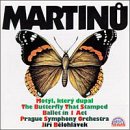| All Artists: Bohuslav Martinu, Jiri Belohlavek Title: Martinu: The Butterfly That Stamped Members Wishing: 0 Total Copies: 0 Label: Supraphon Release Date: 2/28/1995 Genre: Classical Styles: Ballets & Dances, Ballets, Historical Periods, Modern, 20th, & 21st Century, Symphonies Number of Discs: 1 SwapaCD Credits: 1 UPC: 789368923823 |
Search - Bohuslav Martinu, Jiri Belohlavek :: Martinu: The Butterfly That Stamped
CD Details |
CD ReviewsGreat performance of less-than-great music. Martin Selbrede | The Woodlands, Texas | 10/13/2005 (3 out of 5 stars) "I've been a fan of Bohuslav Martinu for a quarter century, and own multiple versions of all his symphonies and other major works. This ballet is for dedicated completionists -- there are other works of Martinu's to consider before going here, and this is probably NOT the Martinu to buy if you're looking for an introduction to this Czech composer. Even the program notes acknowledge this work to be something of a half-way house in the stylistic development of Martinu. It's pleasant enough to listen through, but little sticks or is memorable. It's a style that isn't fully congealed. Any given brief block of music sounds impressive, but the whole doesn't cohere well. This is, to be fair, a perennial problem with ballet music (and the reason suites made from ballets are often more popular than the full ballets: less filler!). The Rudyard Kipling story is fascinating, and sometimes you can imagine the action that might correspond with the music, which never fails to be atmospheric. The work presages the Martinu to come, but the Martinu to come was a better, more mature composer. Evidently, this piece was never performed in Martinu's lifetime, primarily because the publisher of Kipling's story wanted royalties on any production using the copyrighted story. Martinu being poor, that ended that.
There is nothing wrong with the performance, which is exceptional in all respects. It appears this ballet gets every opportunity to make a good impression in Jiri Belohlavek's capable hands. If it fails to do so, the fault doesn't lie with the conductor or orchestra. On the other hand, this MAY be your cup of tea. The use of wordless chorus was probably very original when this work was written, but it sounds cliched to today's jaded ears (except perhaps as deployed by Veljo Tormis in his "Swan Flight")." |

